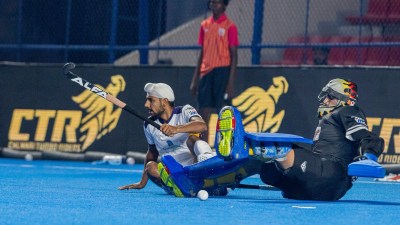US grapples with policy towards Pak
WASHINGTON, OCT 15: The United States is struggling to formulate a viable policy towards Pakistan which meets its commitment to democracy...

WASHINGTON, OCT 15: The United States is struggling to formulate a viable policy towards Pakistan which meets its commitment to democracy while still remaining engaged with the military regime that has seized power.
To talk or not to talk, to sanction or not to sanction, to condemn or not to condemn, were some of the questions American policy makers were grappling with on Thursday as the turbulent events in Pakistan began to sorely test US foreign policy for the region.
The dilemma was best reflected in a Senate testimony by Assistant Secretary of State for South Asia, Rick Inderfurth, in which he finally acknowledged that the military takeover in Pakistan met the US definition of a coup and that sanctions are inevitable. But Washington has held back from making an announcement momentarily pending the meeting of the US ambassador in Islamabad, William Milam, with the new military dispensation, in order to understand where it is headed and what are the prospects of a quick return to civilian rule. In fact, the promise of a quick return to civilian rule was what the US was hoping for to save it from making the sanctions call, but the declaration of emergency and the suspension of the constitution towards the evening made Washington policy-makers8217; life even more miserable.
Shortly before that action, the gathering sentiment and opinion among the political and diplomatic elite was to give the military rulers a long rope and not come down too hard on them for fear of completely isolating Pakistan and pushing it towards Talibanisation. In fact, two significant developments emerged during and after the Inderfurth testimony. One, the US was open to the idea of a return to some sort of civilian rule sans the deposed prime minister. And two, Washington was beginning to realise that it had erred badly in imposing blanket sanctions on Pakistan under the Pressler law, thus losing contact with the Pakistani military.
In particular, the US is regretting one particular fall-out of the Pressler law that cut off interaction between the Pentagon and the Pakistani army under a program called International Military Education and Training IMET.
8220;We have lost touch with a generation of Pakistani military leaders, we believe that IMET should be restored,8221; Inderfurth told the Senate sub-committee chairman Sam Brownback.
Senator Brownback, who comes from a wheat surplus state of Kansas that regards Pakistan as a market was himself of the opinion that it was important to be engaged with Islamabad rather than isolating it. Under the latest Defence Appropriations Bill passed earlier this week, the President is now armed with a permanent waiver authority that enables him to bypass the Pressler law. Indications are that if and when Pakistan begins to turn towards normalcy, the administration will resume IMET while keeping the screws on supply of military hardware. But the prospect of relaxing or waiving Pressler law has already alarmed Indian supporters on the Hill and over the past two days there has been a chorus from lawmakers pointing to the military takeover in Pakistan as a good reason why Washington should not even dream of resuming military dealings of any kind with Islamabad.
At least one Congressman, New Jersey8217;s Frank Pallone, is moving a bill seeking to quash the Pressler waiver and return things to staus quo.
That Washington is willing to give the military rulers of Pakistan a little more time was evident in remarks by both President Clinton and Secretary of State Madeleine Albright, who, while urging a return to civilian rule, seemed to indicate they would wait for events to unfold before acting.
Inderfurth appeared to give the military rulers a wide berth while outlining the possible scenarios in Pakistan.
8220;There are a variety of ways he General Musharraf could see a civilian government established, the one that is top of the list right now is for him to turn power over to a civilian government headed by technocrats, that could head a caretaker government for a period of time, six months to a year, and then elections being held,8221; Inderfurth said.
Although he qualified his remarks as speculative, the scenario he outlined suggested that Washington could live the temporary disruption of democracy and was ready to dump Sharif, yet another to the long line of undistinguished third world leaders Washington has ditched when the going got tough.
However, while readily giving up Sharif8217;s claim to return to power, the administration spoke up to counter the theory that it may have been responsible for the coup by putting pressure on the former prime minister to withdraw troops from Kargil. 8220;Prime Minister Sharif did the right thing,8221; Clinton said at a press conference yesterday, praising him for averting a fullscale war and perhaps even a nuclear exchange. Inderfurth echoed that, but clarified that the Kargil misadventure was an operation planned by Musharraf and cleared by Sharif, although the former prime minister later realised it was a mistake and backed down.
- 01
- 02
- 03
- 04
- 05































